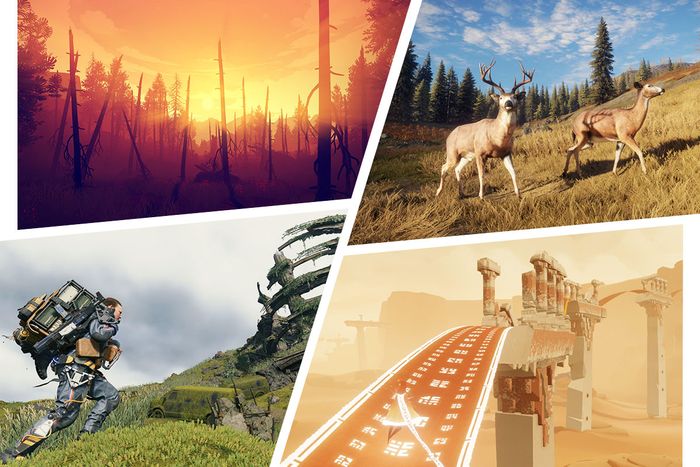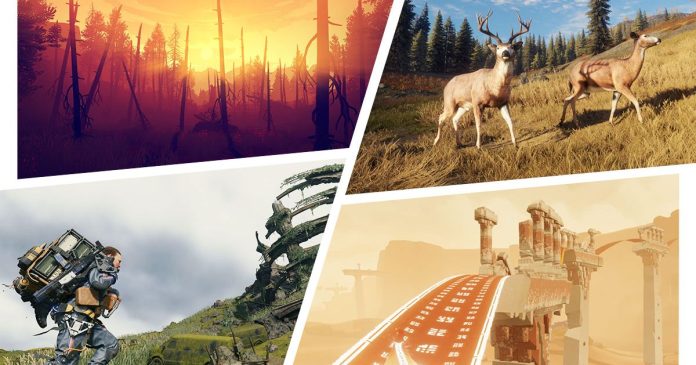
Photo: Vulture; Photos: Campo Santo, Expansive Worlds, thatgamecompany, Kojima Productions
Death Stranding 2: On the Beach, the madcap delivery sequel from gaming’s preeminent auteur, Hideo Kojima, is a terrific example of a fantasy that video games do brilliantly: hiking through the wilderness. Sure, few game designers simulate the activity quite so obsessively as Kojima; he challenges us to consider the types of terrain we are traversing, the weight distribution of our packs, and even our map-reading skills. But less mechanically demanding games like Journey also arouse those nearly indescribably wonderful feelings associated with trekking: freedom, awe, fear, maybe loneliness — above all, the sensation of being totally immersed in nature.
Games like Journey built on the so-called walking simulators of the late 2000s and early 2010s. Prior to the genre’s formation, virtual spaces were filled with enemies to beat and puzzles to solve. But walking sims ushered in a new wave of titles that saw the player moving through an environment, simply observing and absorbing. They were meditative, slow moving, and (mostly) nonviolent, more akin to an Andrei Tarkovsky or Béla Tarr movie than, say, Michael Bay’s popcorn action flicks — and they arrived like a shot in the arm to video games.
True, Death Stranding 2 is an audacious fusion of Tarkovsky and Bay (it features fire-spewing guitar machine guns!). The major kicker to the game’s release is that it’s only available on PlayStation 5 (at least for the time being). With this in mind, we’ve run down 11 more games, available on a plethora of platforms, that foreground the act of hiking. You’re often doing more than just walking, but traversal in expansive environments makes up the greater body of these experiences. Cute; miserable; art house: Regardless of form or style, virtual rambling proves that, just as in the real world, a walk is but a step away from a story.
Platforms: Nintendo Switch, PC, PlayStation 4, Xbox One
Breezy and sweet, A Short Hike is a languid summer afternoon in video game form. You play as Claire, a young bird who is away on holiday. There’s an array of activities for you and her to do: potter around camp, chat with locals, play a few games of beachstickball, and, naturally, ascend to the top of a hill to get phone signal. The cute character models and chunky environments evoke Gamecube-era Animal Crossing while mechanically, it’s pure The Legend of Zelda: Breath of the Wild. The hiking, climbing, and swooping is wonderfully freeform, letting you carve your own path through this peaceful mountainside landscape.
Platforms: PC, PlayStation 4/5
Photo: Kojima Productions
Compared to its 2019 forebear, Death Stranding 2: On the Beach is bigger, louder, and more action-packed — a true sequel in every sense. For this reason, the original actually offers the purer hiking experience, one in which you spend less time worrying about paramilitary foes and more time thinking, how the hell am I going to make it over that mountain? The answer invariably involves high-tech ladders; zip-lines (yes), and no end of clumsy scrambling over treacherous terrain, all while you lug delivery items for the survivors in this post-apocalyptic take on America. As the game progresses, the hikes get longer and more dangerous; you come to feel something of the physical hardship endured by protagonist Sam Bridges (Norman Reedus). His back aches; your thumbs are sore; the trek has changed you both.
Platforms: PC, Nintendo Switch, PlayStation 4, Xbox One
The setting of Firewatch, Shoshone National Park, doesn’t actually exist but it sure does feel like it. Partly, that’s because this fictional take on the Wyoming wilderness is stunningly rendered: roaring orange sunsets; powder-blue skies; lush green pines; trickling turquoise waters. The setting also feels real because it’s the site of an utterly touching, expertly crafted story: Middle-aged Henry has retreated into the mountains to make sense of the implosion of his marriage to Julia, who is suffering from early-onset dementia. As you hike, scramble, and climb around the reserve, the game deftly captures how landscape naturally comes to reflect our own interior states — and the way we can never really separate the two.
Platforms: PC, PlayStation 4, Xbox One
Tense, thrilling and frequently unforgiving, Ghost Recon: Breakpoint sees you spend many hours hiking through the overgrown jungles of a fictional Pacific island. But in this tactical military shooter, the challenge stems not necessarily from navigating the environment but making it past the horde of private militia that stalk about it. Our advice? Ignore the story (which is your typical tech-CEO-gone-rogue-type fare). Instead, make your own adventure in an open-world sandbox whose systems openly sow chaos and confusion. Breakpoint plays like a furiously intense game of cops and robbers; these hikes set the pulse racing.
Platforms: iOS, PC, PlayStation 3/4
Journey looks a lot like other video games: It has levels, an avatar, and enemies. But mechanically, it eschews almost all else to focus entirely on movement. At first, you’re serenely gliding about a desert flecked with Gustav Klimt gold. Later, you venture into chilly subterranean caves filled with wondrous yet terrifying creatures. Finally, and in heartbreaking style, you must ascend a mountain, putting one foot in front of the other until, succumbing to the massif itself, you can move no more. This is illustrative of what makes Journey an all-timer: the way it hits you in your emotional solar plexus — not through cutscenes but interactions alone. The cherry on the cake is the game’s ambient multiplayer, which can see other human players join your game session. Their appearance is magical, as if you’re encountering another hiker on the prettiest, remotest of trails.
Platforms: Nintendo Switch, PC, PlayStation 4, Xbox One
Photo: Megagon Industries
Lonely Mountains Downhill isn’t a hiking game; it’s actually a mountain-bike racer. But the debut from Berlin studio Megangon merits inclusion on this list because of the way it summons some of the same crystalline sensations encountered during a day ambling in the great outdoors: It’s as if you can taste the clean, high-altitude air, feel the wind on your face, and hear the quietness which is only encountered tens of miles away from a busy road. The actual racing is wonderfully adrenaline-pumping. But it’s the enchanting ambience which sets this one apart.
Platforms: PC, PlayStation 5, Xbox Series S/X
Minimalist yet visually ravishing, Lushfoil Photography Sim casts you as a lone hiker with a DSLR camera. There is no story to speak of: Instead, you soak up the vibes of real-life settings, like the Italian Alps and the temples of Kyoto, Japan, while taking snaps. More than other video games, what Lushfoil Photography Sim evokes is the ambient ASMR hiking videos popular on YouTube. Stepping into these spaces, you can almost feel your worries ebb away in real time.
Platforms: PC, PlayStation 3/4, PlayStation Vita
Photo: Ed Key and David Kanaga
Can you draw a direct line from Death Stranding’s blockbuster hiking to this art house darling of the early 2010s? Maybe! Proteus is a walking simulator, helping reimagine the mechanics of video games: Guns and violence were eschewed for greater emphasis on mood and movement. At first glance, the pixelated 3-D world of Proteus looks a lot like Minecraft. But your task isn’t to scrabble around in the dirt or build cosy cottagecore abodes: You simply walk around a procedurally generated island, seeing it segue from one season to the next. Leaves change color; rain starts to fall. But wait! What are these ominous prehistoric standing stones? All this takes place to a soundtrack of gurgling, chiming electronics that react dynamically to your movement. Few games capture with such deft poetry the sensory delight that can occur while simply being in nature.
Platforms: PC, Xbox Series S/X
Video games scarcely come more brilliantly miserable than this survival shooter sequel set in the Chernobyl exclusion zone. This location is home to both a rogue’s gallery of mutants and the titular stalkers who eke out a living scavenging artifacts. Because there are no vehicles, you must make every long, arduous journey on foot. This is one of the ways the game makes very few concessions to the player: another is the environment itself. In S.T.A.L.K.E.R. 2, the Zone is conspicuously horizontal. Forget about “see that mountain”; when you do get a good view, all you see is a shimmering expanse of bog and grassland — oppressive yet beautiful in its own way.
Platforms: Nintendo Switch/2
The Legend of Zelda: Breath of the Wild upended the open-world genre in 2017. There are few waypoints and no glittering trails guiding you to your next location. Rather, you’re trusted to find your own path in this painterly, Studio Ghibli–esque vision of Hyrule. One of the most striking parts of the game is the way weather affects your journey: Rain makes rocks slippery; lightning is deadly. On many occasions, you’ll find yourself hiding for cover, waiting for a storm to pass — something all hikers can relate to. Eight years on from its release, Breath of the Wild still feels revolutionary: There is always something new beyond the next hill, and there are a million different ways to stumble across it.
Platforms: Nintendo Switch, PC, PlayStation 4, Xbox One
Photo: Hinterland Studio Inc.
A game of vivid Canadian wilderness stippled with salmon sunsets and flashes of evergreens, The Long Dark offers an achingly beautiful survival experience, but a brutal one nonetheless. Every moment you’re burning calories, and probably burning precious daylight. You need to manage various meters: food, thirst, fatigue. And yet, if you make it past the game’s mercilessly tough opening hours, the game eases up — a little, at least. Few titles conjure a sense of existential relief quite like it. Perhaps you’ve been trekking across a frozen lake, fighting off bears and wolves (or more likely, running away). You’re exhausted, one cold night away from death. But then you come across a few broken pieces of plywood in order to start a fire; you spot a cabin submerged in snow. You’ve never felt such luck in your life.
Platforms: PC, PlayStation 4, Xbox One
Slow, moody, and dripping with atmosphere, theHunter: Call of the Wild sees you exploring beautiful environments while hunting big, majestic game: Think wild boar, blacktail deer, and European bison. On the one hand, this is a masochistically complicated hunting simulator. You must consider how much noise you’re making, the direction of wind (which carries your scent), and even your own heart rate to make that all-important kill. On the other hand, these rugged wildernesses, situated in the U.S., Norway, Spain, and more, really are something else: Foliage sways in the wind; pollen motes drift through the air; dappled light shimmers beneath trees. Such is the deftly rendered magnificence of these wilds, you may find yourself ignoring the hunts altogether and just going for a nice, long walk.
The 12 Best Hiking-Simulator Video Games
